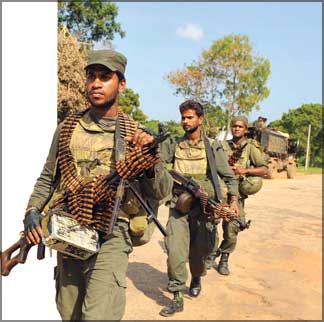Fonseka’s allegation and impact on Armed Forces
A legal perspective:
Professor G. L. Peiris Export Development and
International Trade Minister
The Cabinet of Ministers, at their meeting on December 23 decided to
take serious note of allegations by General Sarath Fonseka to the media.
The Cabinet resolved to use all means at its disposal to prevent
irreparable harm from being inflicted on the country as a result of
these allegations. This was the gist of the statement, issued by the
Prime Minister on behalf of the Cabinet.
The Cabinet’s purpose, in making this decision, was to achieve three
objectives.
|

Allegations betrayed the Armed Forces. File photo |
i) to ensure that the honour and integrity of the nation are not
tarnished by reckless and unfounded allegations;
ii) to protect members of the 58th Division in particular, and
members of Sri Lanka’s Armed Forces in general, from the substantial
risk of arrest and prosecution while travelling abroad;
iii) to prevent Sri Lanka’s Armed Forces, and members of the Police
Force, from being deprived of the opportunity to serve in United Nations
Peace Keeping Forces in different parts of the world.
The point of departure is to acknowledge, in stark and explicit
terms, the gravity of the peril to which members of the country’s Armed
Forces are exposed as a direct consequence of the allegations attributed
to General Fonseka.
This is not a matter of implication or inference. The risk arises
from the clearest possible exposition of the principles of public
international law, applicable to this situation, by courts of
unimpeachable authority.
Let us take, hypothetically, the case of a member of the 58th
Division travelling in the United Kingdom on official business, for
medical treatment, in connection with the education of a child, on
holiday or for any other purpose.
Degree of the risk
General Augusto Pinochet, in similar circumstances, was arrested in a
London hospital a few minutes before midnight on October 16, 1998. The
warrant of arrest was issued by a metropolitan magistrate in London
pursuant to an order by the Fifth Central Magistrate of the National
Court of Madrid in Spain.
The evidence against Pinochet was largely circumstantial. By
contrast, members of our own Armed Forces are directly implicated by the
statement of General Fonseka who was Commander of the Sri Lankan Army at
the relevant time. The nature and degree of the risk to which they are
exposed are all too evident on the basis of emphatic statements of the
governing law in the Pinochet case.
|

Professor G. L. Peiris |
The final hearing was by the highest court in the United Kingdom -
The House of Lords - in the presence of seven Law Lords.
Their exposition of the principles of public international law, which
will clearly govern the liability of members of the 58th Division, will
enable the public in our own country to assess for themselves the
gravity of the situation.
In the Pinochet Ugarte case Lord Phillips of Worth Matravers, in the
House of Lords observed: “There are some categories of crime of such
gravity that they shock the consciousness of mankind and cannot be
tolerated by the international community.”
There can be no conceivable doubt that the cold blooded killing of
persons attempting to surrender with white flags falls well within this
category of crime.
Lord Phillips continued, and his comments are immediately relevant:
“Any individual who commits such a crime offends against international
law.
The nature of these crimes is such that they are likely to involve
the concerted conduct of many, and liable to involve the complicity of
the officials of the State in which they occur, if not of the State
itself. In these circumstances it is desirable that jurisdiction should
exist to prosecute individuals for such conduct outside the territory in
which such conduct occurs”.
The firm entrenchment of this doctrine in public international law
today is underscored in the judgement of Lord Goff of Chieveley: “It can
no longer be doubted that, as a matter of general customary
international law, a state official will personally be liable to be
called to account if there is sufficient evidence that he authorized or
perpetrated such serious international crimes.”
Not only is the principle of personal penal liability one of the core
values of the international legal system at the present day, but there
is categorical recognition of the duty of all states to uphold and
enforce this principle without compromise in any form.
Lord Hutton, delivering judgement in the Pinochet case said: “There
is a clear recognition by the international community that certain
crimes are so grave and so inhuman that they constitute crimes against
international law and that the international community is under a duty
to bring to justice a person who commits such crimes.”
Technical bars
The wide sweep of this imperative duty, and the tenacity with which
countries are enjoined by international law to give effect to it, form
the cornerstone of the judgement by Lord Nicholls of Birkenhead.
“The United Nations has put some of the necessary nuts and bolts into
place for bringing persons suspected of having committed such offences
to trial in the courts of individual states. States were to assist each
other in bringing such persons to trial, asylum was not to be granted to
such persons, and States were not to take any legislative or other
measures which might be prejudicial to the international obligations
assumed by them in regard to the arrest, extradition and punishment of
such persons.”
There can hardly be a more comprehensive statement of the elements of
the all-embracing duty of nations to deal with crimes belonging to this
category (of which the allegation by General Fonseka represents an
undeniable instance) with exemplary severity.
The array of technical bars to the exercise of jurisdiction which can
ordinarily be called in aid, are rigidly excluded in these cases because
of their inherently repugnant character. This is asserted with great
emphasis in the judgement of Lord Millett: “The principle of
international law, which under certain circumstances protects the
representatives of a State, cannot be applied to acts which are
condemned as criminal by international law.”
Persuasive authority
These pronouncements, at the highest level of the judicial hierarchy
of the United Kingdom are binding on all British courts and are accepted
as being of persuasive authority throughout the Commonwealth. Their
cumulative effect offers a clear indication of the measure of jeopardy
in which members of Sri Lanka’s Armed Forces stand today, because of the
direct testimony contained in General Fonseka’s statement.
What is abundantly clear from the judgement in the House of Lords,
applying the body of international law in force today, are the following
propositions:
i) The law of nations looks upon crimes encompassed within the
category described by General Fonseka, with the greatest odium and
revulsion,
ii) Personal liability, which cannot be disowned or repudiated,
attaches to perpetrators of such crimes, no defence relating to superior
orders being available.
iii) In an increasingly wide range of circumstances referred to in
international legal instruments and the prevailing customary law, the
courts of many jurisdictions, rejecting technicalities, are showing
themselves disposed to assert authority in respect of persons accused of
this type of crime.
iv) The intuitive inclination of the courts of many countries is to
lean towards assumption of, rather than abstention from, jurisdiction in
these cases and towards the imposition of condign punishment.
In substance, these are the reasons why the Government, on receipt of
the letter of 18th December sent by United Nations Rapporteur on
Extra-judicial Summary and Arbitrary Executions Philip Alston has
thought it necessary to take serious note of its contents and to use all
means at its disposal, by convincing rebuttal, to aborted the very
threshold procedures fraught with the risk of serious consequences for
Sri Lanka’s Armed Forces. |



